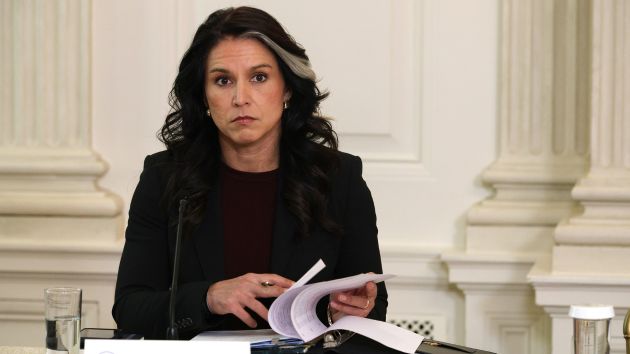US reaches debt limit amid showdown and ‘extraordinary measures’
Written by ABC Audio ALL RIGHTS RESERVED on January 19, 2023

(WASHINGTON) — The United States on Thursday reached its borrowing limit, the Treasury Department said, teeing up a congressional showdown later this year with potentially devastating economic consequences.
The federal government can pay most but not all of its bills with the tax and other revenue it takes in, and it must borrow the rest of the money. But Congress enforces a limit on how much debt the government can incur and when that limit — currently about $31.4 trillion — is reached, lawmakers must increase it before the government can borrow more funds.
Republicans in the House say they will insist on deep spending cuts in exchange for their cooperation in again raising the debt ceiling. But Democrats, led by the Biden administration, want a so-called clean hike without concessions on spending and they are publicly signaling they won’t negotiate on the matter.
Thursday’s deadline isn’t yet an economic calamity. But it does mean that the Treasury is going to begin stretching its funds by implementing what Secretary Janet Yellen last week called “extraordinary measures” to keep the federal government fully funded and to avoid a default on its debts.
A full default has never happened — the Congressional Research Service cited a “mini-default” in 1979 that was linked to delayed payments to some investors — but if one did occur, it would likely downgrade the nation’s credit rating, damage its ability to borrow and cause markets around the globe to roil.
Treasury’s newly enacted measures, like cutting contributions to employees’ retirement plans, are expected to stave off bigger problems through sometime this summer, according to a letter Yellen sent to congressional leaders on Friday, giving Congress just a few months to act.
“The use of extraordinary measures enables the government to meet its obligations for only a limited amount of time,” Yellen wrote in her letter. “It is therefore critical that Congress act in a timely manner to increase or suspend the debt limit. Failure to meet the government’s obligations would cause irreparable harm to the U.S. economy, the livelihoods of all Americans, and the global financial stability.”
With the clock ticking on the divided Congress, political brinkmanship on raising the federal debt limit — a move that has come to be seen as politically poisonous in recent years, after fiscal fights under President Barack Obama — is already reaching an all-time high.
Republicans now hold the gavel in the House, and they have said they’ll look to extract major concessions from Democrats in exchange for their necessary cooperation to raise the federal cap. Newly minted Speaker Kevin McCarthy holds the reins on negotiations in the chamber.
To secure the speakership, McCarthy made major promises to the conservative wing of his conference, including seeking to reduce federal spending to fiscal year 2022 levels. The Republicans who supported McCarthy will expect him to use the debt limit as leverage for these cuts.
McCarthy said he wants to negotiate directly with President Joe Biden.
“I had a very good conversation with the president when he called me, and I told him I’d like to sit down with him early and work through these challenges,” McCarthy said during a press conference last week. “We don’t want to put any fiscal problems on our economy and we won’t. But fiscal problems would be continuing to do business as usual.”
White House press secretary Karine Jean-Pierre has side-stepped questions on whether the two men will meet.
“Congress is going to need to address the debt without conditions. And it’s just that simple. There should be no hostage-taking here. There should be no attempts to exploit the debt ceiling or to leverage it,” she said during a press briefing on Tuesday.
“As you’ve heard us say before, we will not be doing any negotiation over the debt ceiling,” she said last week. “It’s not and should not be a political football. … And that’s how we see this process moving forward.”
On Wednesday, Jean-Pierre told reporters that the White House has been “reaching out to all members from both sides of the aisle” but said again that the administration didn’t want to compromise on the debt ceiling. She said both parties have repeatedly voted to raise the limit in the past, including under President Donald Trump.
“It is essential for Congress to recognize that dealing with the debt ceiling is their constitutional responsibility. This is an easy one. This is something that should be happening without conditions,” she said.
While the debt limit fight will likely be heightened in the House, Senate Republicans have a bargaining chip of their own: They remain the minority party in the chamber but at least 60 votes are needed to enact any legislation raising the ceiling.
Senate Democrats could seek a higher debt limit through reconciliation, which requires only 50 votes, with Vice President Kamala Harris breaking a tie. But that process is time-intensive and could still be blocked by House Republicans.
The last time the limit had to be raised, in late 2021, Senate Minority Leader Mitch McConnell insisted Democrats increase it on their own. McConnell cut a deal with Senate Majority Leader Chuck Schumer which saw a group of Republicans approve a one-time change to the chamber rules, allowing that debt hike to occur with just 50 votes — all from Democrats.
But that was before Senate Democrats passed Biden’s Inflation Reduction Act a few months later without any Republican support. This time, McConnell might be less inclined to bargain.
Some Senate Democrats wanted to raise the debt limit before House Republicans took control of the lower chamber in January. But they ran out of time to do it during the lame duck session at the end of the last Congress.
Schumer said on CNN last week that he doesn’t regret leaving the debt limit to this term.
“It should be done in a bipartisan way. It always has been,” he said.
He pointed to the 2021 deal he struck with McConnell.
“I think Republicans learned their lesson,” he said. “They suffered, we won the election after that [in 2012], and they will hopefully come and work with us and get this done in a bipartisan way. That’s what we look to do, no brinkmanship.”
While the Biden administration prepares to go toe-to-toe with Republicans, some members of the House GOP conference are crafting a plan to address what might happen if they and Democrats don’t reach a deal to lift the borrowing limit.
The Republican proposal, if it becomes law, would require the Biden administration to prioritize paying back certain debts over others. News of the deal was first reported by The Washington Post.
Sources familiar with the ongoing talks said McCarthy, R-Calif., committed to conservatives that the House would pass the deal and send it to the Senate in the first quarter of 2023 as part of his larger agreement to secure votes to become speaker.
A spokesperson for McCarthy did not respond to calls and messages seeking comment.
Lauren Fine, a spokesperson for Majority Leader Steve Scalise, told ABC News that discussions around the plan “are ongoing with the conference, and the Leader remains a strong proponent of this legislation.”
Even if this legislation passes the House, it almost certainly will not be taken up by Schumer in the Senate.
The Treasury has previously pushed back on the feasibility that it could prioritize certain bills over others, citing legal and logistical issues.
ABC News’ Sarah Kolinovsky contributed to this report.
Copyright © 2023, ABC Audio. All rights reserved.
 KVSP
KVSP 




